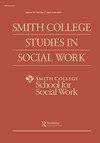在冠状病毒大流行期间为变性青年父母提供护理的挑战
IF 0.9
Q2 SOCIAL WORK
引用次数: 5
摘要
摘要新冠肺炎大流行给许多人带来了压力,加剧了全球焦虑、抑郁和其他心理健康问题。随着病毒的传播,许多年轻人发现自己与同龄人身体隔离,被限制在家中,以前亲自提供的医疗和心理健康服务不得不通过提供虚拟会议来适应。向虚拟护理的过渡给临床医生和患者带来了许多新的挑战,包括一些针对变性青年及其家人的挑战。在新冠疫情之前,跨性别青年是一个边缘化和弱势群体,不良心理健康后果的风险较高。然而,社区支持、强烈的群体认同和家庭肯定可以成为重要的缓解因素。在这篇论文中,我们将讨论在虚拟访问中与变性青年的父母和照顾者合作时遇到的独特挑战,这些挑战可能会干扰治疗联盟的发展和提高家庭接受度的运动。我们将提供临床案例,并提出解决困难和改善护理的方法。本文章由计算机程序翻译,如有差异,请以英文原文为准。
Challenges in Providing Care for Parents of Transgender Youth during the Coronavirus Pandemic
ABSTRACT The COVID-19 pandemic has been stressful for many, increasing levels of anxiety, depression and other mental health concerns worldwide. With the spread of the virus, many youth found themselves physically isolated from their peers and confined to their homes, and medical and mental health services previously provided in person had to adapt by providing virtual sessions. The transition to virtual care created many new challenges for clinicians and patients, including some specific to transgender youth and their families. Pre-pandemic, transgender youth comprised a marginalized and vulnerable population, with elevated risk for adverse mental health outcomes. However, community support, strong group identification and family affirmation can serve as important mitigating factors. In this paper, we will discuss unique challenges encountered in working with the parents and caregivers of transgender youth during virtual visits that have the potential to interfere with development of a therapeutic alliance and the movement toward increased family acceptance. We will provide clinical case examples and propose methods through which to address difficulties and improve care.
求助全文
通过发布文献求助,成功后即可免费获取论文全文。
去求助
来源期刊

SMITH COLLEGE STUDIES IN SOCIAL WORK
SOCIAL WORK-
CiteScore
1.50
自引率
10.00%
发文量
10
期刊介绍:
Smith College Studies in Social Work focuses on the vital issues facing practitioners today, featuring only those articles that advance theoretical understanding of psychological and social functioning, present clinically relevant research findings, and promote excellence in clinical practice. This refereed journal addresses issues of mental health, therapeutic process, trauma and recovery, psychopathology, racial and cultural diversity, culturally responsive clinical practice, intersubjectivity, the influence of postmodern theory on clinical practice, community based practice, and clinical services for specific populations of psychologically and socially vulnerable clients.
 求助内容:
求助内容: 应助结果提醒方式:
应助结果提醒方式:


